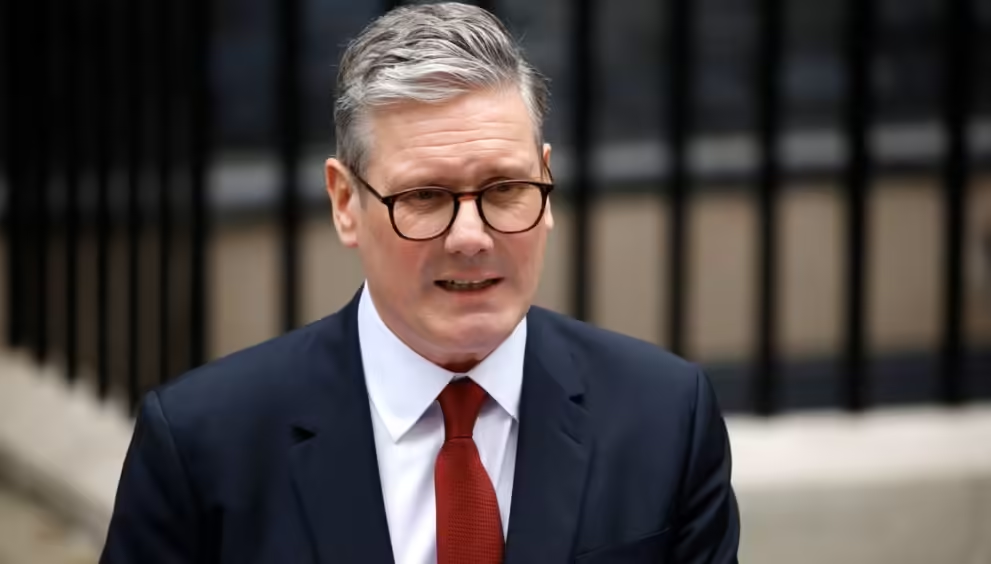UK PM Starmer declares globalization over, aligning with Trump’s economic nationalism as markets brace for global trade upheaval.
The post-Cold War dream of a globally integrated economy appears to be unraveling. As protectionism resurfaces across the world, two of the West’s most influential leaders—U.S. President Donald Trump and UK Prime Minister Keir Starmer—are signaling a sharp departure from free trade orthodoxy. Trump’s aggressive new round of reciprocal tariffs has shaken financial markets, while Starmer is expected to publicly declare that “globalization has failed millions.” Together, these moves indicate that the world is entering a new era marked by economic nationalism, reshoring of industries, and strategic trade alliances.
Trump’s Tariff Tsunami: Triggering a Global Shockwave
In his latest move, President Trump announced a sweeping set of tariffs that serve as the cornerstone of his revived “America First” strategy. The new measures, which came into effect at 12:01 a.m. Saturday ET, include a 10% baseline levy on a wide range of imports. Some targeted nations face far steeper duties: 50% for Lesotho, 49% for Cambodia, and 47% for Madagascar.
The move, which Trump called an “economic revolution” in a fiery social media post, is meant to redirect trillions of dollars in investment back to the United States. The markets, however, have responded with anxiety:
– S&P 500 and Nasdaq dropped over 2% in anticipation of retaliatory measures.
– Gold prices surged, nearing record highs as investors sought safe-haven assets.
– Treasury yields fell, reflecting broader risk aversion and expectations of slower global growth.
Starmer’s Pivot: Acknowledging the End of an Era
Against this backdrop, UK PM Keir Starmer is expected to deliver a landmark speech declaring the “end of globalization.” According to The Times, Starmer will admit that the economic liberalization that followed the Soviet Union’s collapse in 1991 has “failed millions“, particularly in Western democracies. His statement acknowledges the root of populist discontent that leaders like Trump have capitalized on—economic policies that seemingly benefited the elite while leaving middle and working-class voters behind.
Starmer’s government is now working on supply-side reforms to drive growth and regain voter confidence. These include easing regulations on electric vehicle (EV) manufacturing and advancing parts of the country’s industrial strategy. The focus is clear: domestic productivity, energy independence, and industrial self-reliance are the new mantras of UK economic policy.
Though the UK government does not support Trump’s tariffs, it recognizes the public sentiment behind them. A senior UK official stated:
“Globalization is over, and we are now in a new era… We’ve got to demonstrate that our approach, a more active and reformist government, can provide the answers.”
The UK’s Trade Strategy: Realigning with Strategic Partners
As Prime Minister Keir Starmer redefines Britain’s economic strategy, the UK is actively working to secure new trade agreements and partnerships that align with a post-globalization vision. A key development on this front is the upcoming Economic and Financial Dialogue with India, scheduled for Wednesday. The UK is aiming to expedite its long-delayed Free Trade Agreement (FTA) with India, one of the world’s fastest-growing economies. With its large, young workforce and expanding consumer base, India is increasingly viewed as a crucial strategic partner in the evolving global order.
Simultaneously, the UK is pursuing ongoing negotiations with Australia. These talks are focused on strengthening bilateral trade, especially in high-potential areas like agriculture and technology. Australia’s position as a stable, resource-rich economy makes it a natural ally in Britain’s broader trade diversification efforts.
Together, these developments mark a strategic pivot away from dependence on the European Union and traditional trade blocs. Instead, the UK is embracing a more diversified, bilateral approach, targeting high-growth markets that align with its new economic goals in a rapidly changing global landscape.
Global Implications: Markets, Diplomacy, and Security
The global implications of this economic pivot extend far beyond tariffs and trade policy, they are deeply intertwined with geopolitics and international security. The economic realignments prompted by U.S. President Donald Trump’s aggressive tariff measures have sent shockwaves through global markets, forcing world leaders to respond not only with economic strategies but also with diplomatic coordination.
In the immediate aftermath of Trump’s announcement, UK Prime Minister Keir Starmer and French President Emmanuel Macron issued a joint statement, cautioning against the dangers of a global trade war. While acknowledging that “nothing should be off the table” the leaders also emphasized the need for businesses to remain vigilant and prepared for rapid changes in global trade dynamics.
Beyond economics, the two leaders turned their focus to the war in Ukraine, highlighting the inseparable connection between economic power and geopolitical influence. They reaffirmed their commitment to strengthening the “Coalition of the Willing”, a group of allied nations prepared to support Ukraine both militarily and diplomatically. Discussions included potential peacekeeping operations in the event of a ceasefire, underlining how economic resilience and coordinated diplomacy will be critical in shaping outcomes in conflict zones and maintaining global stability.
Why This Matters: The New Economic World Order
The shift away from globalization is not just a change in trade dynamics, it represents the emergence of a new economic world order with far-reaching consequences for businesses, governments, and consumers alike.
One of the most immediate outcomes will be the reshoring of industries, as countries prioritize bringing manufacturing and critical sectors back within their borders. This move is intended to reduce dependency on foreign supply chains, especially in areas like semiconductors, pharmaceuticals, and defense technologies, where recent disruptions have highlighted vulnerabilities.
Simultaneously, we are likely to witness trade fragmentation, where expansive multilateral agreements give way to more targeted bilateral or regional trade pacts. These new arrangements will often be shaped not purely by market efficiency, but by political alignment and strategic interests, reflecting a more protectionist and security-conscious economic environment.
However, this realignment comes with trade-offs. Consumers in developed economies like the U.S. and Europe may face rising costs, as tariffs on imported goods translate into higher prices across a range of everyday items, from electronics to food products. These inflationary pressures could strain household budgets and affect consumer behavior.
On the investment front, capital flows are expected to shift toward countries that offer regulatory clarity, strong domestic markets, and industrial momentum. In this new landscape, India stands out as a major beneficiary, with its growing economy, digital infrastructure, and demographic advantage positioning it as a preferred destination for global investors seeking both growth and stability.
Conclusion: A Turning Point in Economic History
The coordinated shift in rhetoric and policy from the U.S. and UK signals a defining turning point in the global economic landscape. Globalization, while transformative, has left deep inequalities in its wake, fueling the rise of populism and economic nationalism. As Trump reignites trade wars and Starmer formally acknowledges the end of globalization, Western economies are recalibrating their strategies toward resilience, domestic strength, and strategic sovereignty. For investors, businesses, and policymakers alike, this moment demands agility and foresight. While the age of frictionless global trade may be waning, a new era, rooted in national interest and economic self-reliance, is rapidly taking shape.





